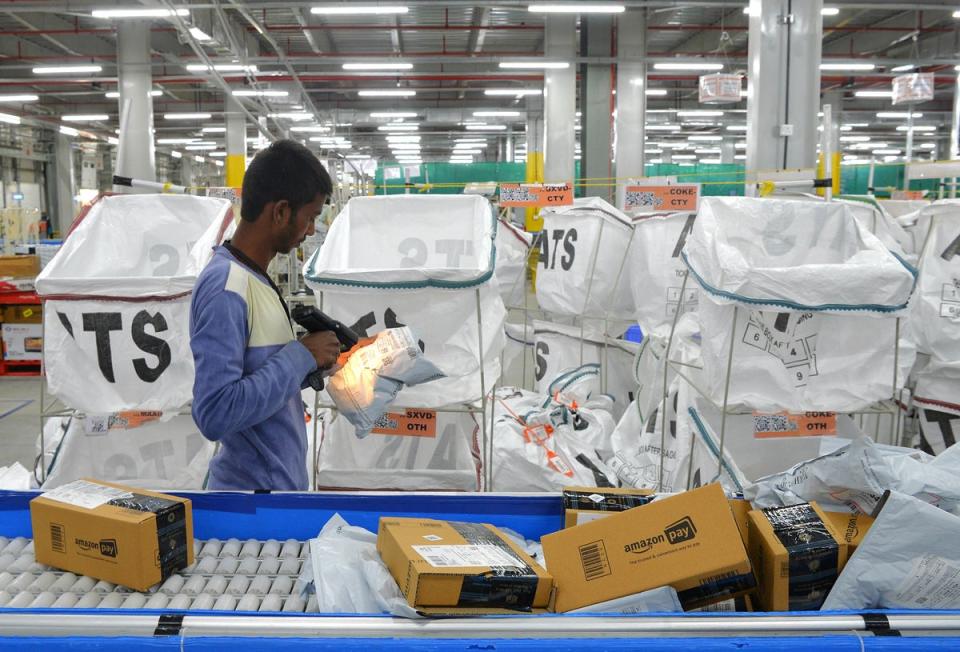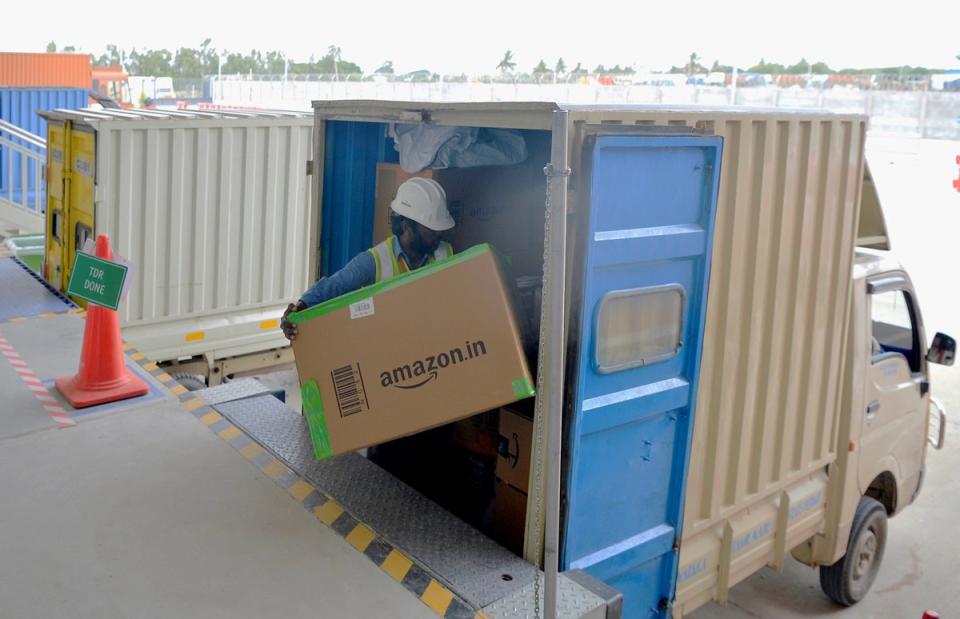Nearly 90% Amazon India workers don’t get enough time for bathroom breaks, survey finds
Nearly 90 per cent of Amazon India’s warehouse employees say they are not allowed sufficient time to use the restroom, according to a new survey that adds to a growing body of evidence of poor working conditions at the multinational corporation.
The results of the survey – conducted by the UNI Global Union, the Amazon India Workers Association and Jarrow Insights, a workers’ cooperative based in London – are detailed in an exhaustive report on the conditions that warehouse workers and drivers of the e-commerce giant in India have to daily endure.
The survey, conducted online between 2 February and 22 March this year, records the responses of 1,238 Amazon India warehouse workers and 600 delivery drivers, accounting for 2 to 5 per cent of the company’s warehouse and delivery workforce in the country.
It comes on the heels of a series of reports about hazardous working conditions at Amazon India’s warehouses.
The Independent last month reported an incident at the company’s Manesar warehouse in the northern Haryana state where workers were allegedly asked to make a pledge that they would not take any breaks, including to drink water or go to the bathroom, until they met their targets as they worked amid a brutal heatwave.
India’s labour ministry intervened after the national human rights commission asked for an investigation.
Responding to the ministry, Amazon India confirmed the incident but played it down as “unfortunate and isolated”.
The survey paints a contradictory picture.
Nearly 81 per cent of Amazon India warehouse employees say work targets set by the company are difficult or very difficult to achieve.
The targets are so demanding, in fact, they barely have time to rest, socialise and sometimes even eat.
“We aren’t even able to talk to anyone at work due to work pressure,” one warehouse worker tells The Independent, speaking anonymously for fear of reprisal.

The workers describe labouring for 10 hours straight on their feet in 35C heat, all for pay of Rs 10,000 (£94) a month.
A typical workday at the Manesar warehouse starts at 8.30am and ends at 6.30pm, with two 30-minute breaks in between. A worker in the inbound department unloads four trucks a day on average, each containing around 10,000 parcels. The number can go up when Amazon offers sales, according to The Indian Express.
Nearly 87 per cent of the company’s warehouse workers say they do not have enough time to use the toilet at work.
A worker who spends her day sorting products says managers come looking for employees they think take too long in the bathroom.
“The designated break rooms are small and unbearably hot, so many female workers end up resting in the bathrooms during their breaks,” she says, responding to the survey.
“But managers come searching for us if they feel we have stayed too long, pressuring us to return to work.”
Another worker says they are ticked off for being late if they take more than 10 minutes in the washroom.
Amazon claims the allegations are “factually incorrect and unsubstantiated”.
“We have not been given access to the material being quoted by The Independent,” a spokesperson for the company tells The Independent, referring to the survey.
“However, from the small amount of information that has been shared with us, we believe these claims are factually incorrect, unsubstantiated, and contradict what our own employees tell us directly. Moreover, the methodology to gather this data appears at best questionable and at worst deliberately designed to deliver on a specific narrative that certain groups are trying to claim as fact.”
An internal survey conducted by the company shows that 87 per cent of the workers at the Manesar facility are satisfied with their jobs, the spokesperson claims, “with as many as eight out of 10 recommending Amazon as a great place to work”.
“The reality is there’s nothing more important to us than the safety and wellbeing of our employees and associates, and we comply with all relevant laws and regulations. Our facilities are industry-leading and provide competitive pay, comfortable working conditions, and specially designed infrastructure to ensure a safe and healthy working environment for all,” the spokesperson says.
The report by the worker associations, however, notes that Amazon enforces productivity targets through a “combination of human managers and automated systems” which creates an uncompromising structure and penalises workers for human error.
Amazon workers have previously said the rigid nature of the targets and the attendance policy leads to many being blacklisted.
A blacklisted worker is essentially barred from ever working for Amazon again.
“They blacklist people on small issues, issue warning letters and terminate them from the company,” a worker says, responding to the survey. Another says workers “are placed in the identity blocklist” if they do not meet targets.
“If we miss a day due to health reasons or family emergencies, our IDs are blocked, impacting our livelihoods,” the Hindustan Times newspaper quoted an unnamed worker as saying.
The Amazon spokesperson claims the productivity targets are in keeping with industry practice.
“Like most companies, we have performance expectations for every employee and associate and we measure actual performance against those expectations. When setting those targets we take into account time in role, experience and the safety and wellbeing of our employees and associates,” the spokesperson says.
“We support people who are not performing to the levels expected with dedicated coaching to help them improve. We are confident that our targets are comfortably achievable by the trained associates. We also expand the associate pool whenever we find it necessary.”

The report by the worker associations, however, notes that 44.9 per cent of warehouse workers and 47.3 per cent of delivery drivers feel the working environment at Amazon is unsafe.
The drivers say they have to resort to unsafe driving to meet targets. “Sometimes, due to delivery targets, we have to drive fast. Then, whom should we ask to look out for our safety? There is no hearing of our grievances,” the report quotes a driver as saying.
“The company says that the weight of an order is upto 40kg but we are given upto 70kg,” says another. “While carrying it, we have to take care of our own safety and that of others which sometimes leads to situations that can become very difficult.”
The report records 46.4 per cent of Amazon India warehouse workers and 37.2 per cent of drivers complaining that their salaries are insufficient to meet basic needs.
The financial strain is exacerbated by stagnating pay amid rising inflation. “I have been with Amazon for eight years. There has been no pay raise in four years. Now the new joining associates and the old associates are on the same salary,” says a warehouse worker.
Amazon says that it provides “fair and competitive wages” and regularly reviews its wage structure against industry benchmarks, “ensuring adherence to all applicable wage laws across the states where we operate”.
“Our comprehensive wage package aims to incentivise and reward our associates through a combination of fixed pay, monthly attendance bonuses, and additional incentives, enabling them to enhance their earning potential,” the company spokesperson tells The Independent.
“In addition, all associates working at our buildings are entitled to Provident Fund and Employees’ State Insurance Corporate benefits, in accordance with applicable laws. All associates have medical, personal accident and term insurance, over and above the minimum statutory requirement of ESIC.”
Amazon has faced scrutiny for making workers labour in abysmal conditions in other countries as well, including the US and the UK.
A 2019 report found that workers at an Amazon warehouse in the UK were having to urinate in plastic bottles rather than go to the toilet during their shifts. Worker unions said they were taking action after more than 600 reports were made from Amazon warehouses to the health and safety executive in the past four years.


